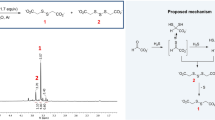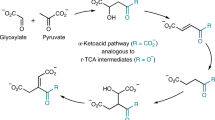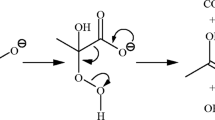Abstract
It has previously been shown that α-ketonic acids liberate carbon dioxide when added to animal tissues under anaerobic conditions1. The evolution of carbon dioxide was found to be due to a ‘dismutation’.
This is a preview of subscription content, access via your institution
Access options
Subscribe to this journal
Receive 51 print issues and online access
$199.00 per year
only $3.90 per issue
Buy this article
- Purchase on Springer Link
- Instant access to full article PDF
Prices may be subject to local taxes which are calculated during checkout
Similar content being viewed by others
References
Krebs and Johnson, Biochem. J., 31, 645 (1937).
Knoop and Oestorlin, Z. physiol. Chem., 148, 294 (1925).
Krebs, Z. physiol. Chem., 217, 191 (1933); Klin. Woch., 11, 1744 (1932).
Edson, Biochetn. J., 29, 2082 (1935).
Adler, von Euler, Günther and Plass, Biochem. J., 33, 1023 (1939).
Dewan, Biochem. J., 32,1378 (1933).
Author information
Authors and Affiliations
Rights and permissions
About this article
Cite this article
KREBS, H., COHEN, P. Glutamic Acid as a Hydrogen Carrier in Animal Tissues. Nature 144, 513–514 (1939). https://doi.org/10.1038/144513b0
Issue Date:
DOI: https://doi.org/10.1038/144513b0
This article is cited by
-
Die Beeinflussung der fermentativen Oxydation bei Muskelerkrankungen durch 1-Glutamins�ure
Klinische Wochenschrift (1955)
-
Die Funktion der Glutamins�ure im Nervengewebe
Die Naturwissenschaften (1953)
Comments
By submitting a comment you agree to abide by our Terms and Community Guidelines. If you find something abusive or that does not comply with our terms or guidelines please flag it as inappropriate.



